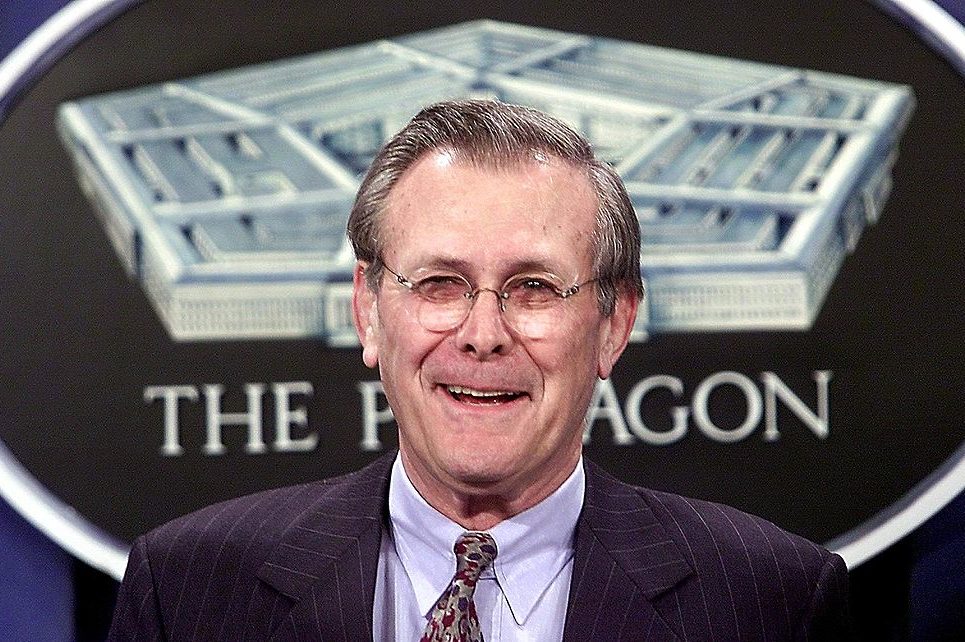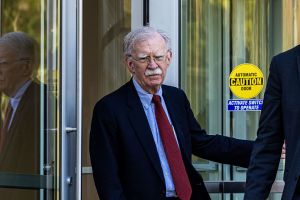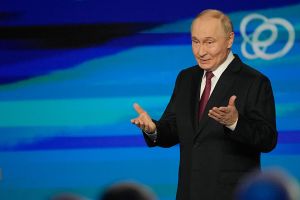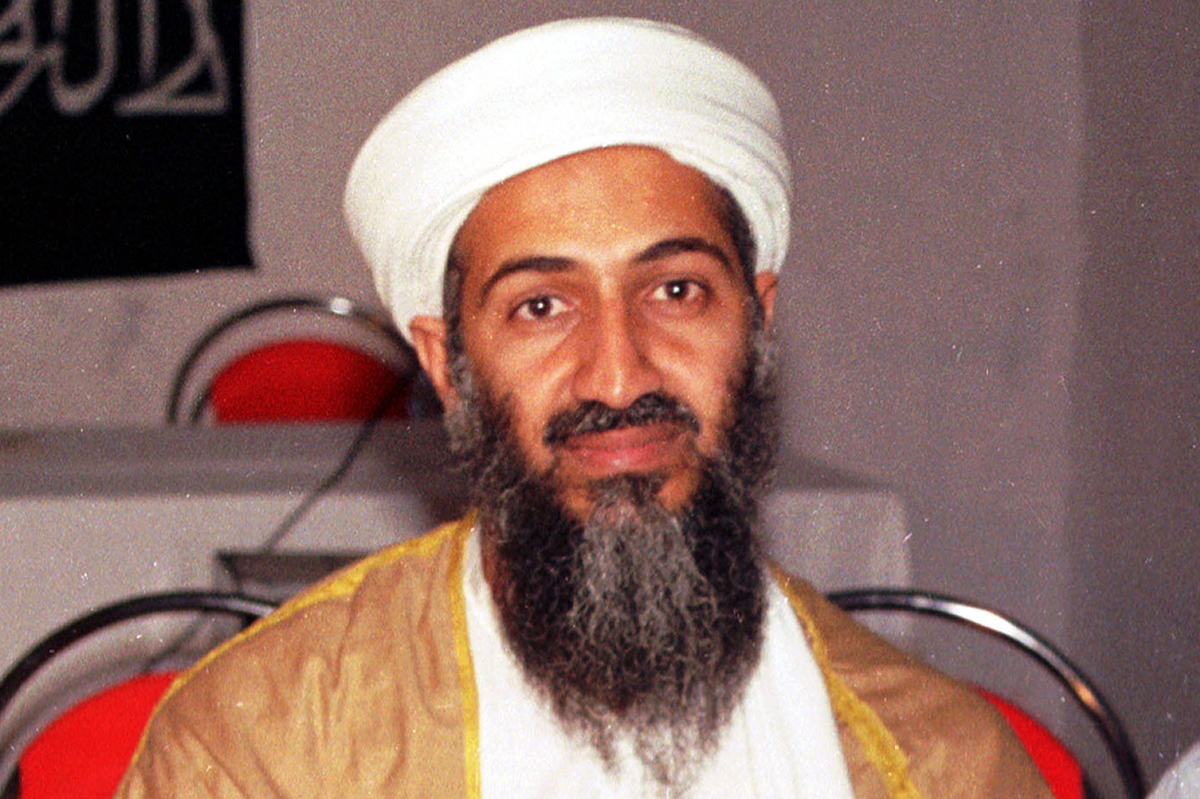What kind of man was Donald Rumsfeld? A successful one, by almost every measure. Ivy League scholar-athlete, captain of Princeton’s football and wrestling teams. Successful candidate for office, easily reelected to Congress twice before he left to join the Richard Nixon administration. There he proved a success at navigating both the federal bureaucracy and the internal politics of the scandal-consumed administration. He survived Nixon’s resignation and soon became Gerald Ford’s chief of staff — and after that, the youngest man ever to serve as secretary of defense, taking charge of a newly-minted all-volunteer force whose morale and discipline were in shambles after Vietnam. Corporate America came to think of Rumsfeld as a turnaround man, too, after he made the troubled pharmaceutical company G.D. Searle and Company competitive again. He met with similar success in later business endeavors.
George W. Bush thought he was taking no chances by making Donald Rumsfeld his secretary of defense in 2001. Nearly a quarter-century may have elapsed since Rumsfeld first held the office, but he was brimming with new ideas about how to remake the armed forces for the 21st century — to streamline them the way he had streamlined operations at Searle. Rumsfeld was a rare mix of experienced bureaucrat and accomplished businessman. He even was an old friend and political ally of Dick Cheney, who had once been his protégé in the Ford administration and succeeded him as Ford’s chief of staff.
What could go wrong?
Rumsfeld, Cheney — who had been George H.W. Bush’s secretary of defense — and Gen. Colin Powell — who had been chairman of the Joint Chiefs of Staff during the 1991 Gulf War — together constituted a reservoir of foreign-policy experience that could hardly be matched. George W. Bush himself might be a neophyte, but his secretary of defense, vice president and secretary of state were seasoned professionals when it came to running the American empire, from the bureaucracy at home to the wars abroad. You couldn’t have asked for better résumés on 9/11.
Yet those résumés led to America’s longest war, the Afghan conflict that still has not ended, and its least strategically justified war, the invasion of Iraq. Amateurs or lifelong failures could have done better than the Republican establishment’s best and brightest and most battle-tested.
Rumsfeld, at least, deserves less blame than Bush or Cheney. The invasion of Iraq would still have happened had Rumsfeld not been secretary of defense — but the war would have been bigger, with more US troops. Rumsfeld was unusual among defense-policy thinkers in believing that less could be more: fewer but better troops was better than overkill. For one thing, as Rumsfeld rightly argued, it meant fewer targets for the enemy. The more Americans who were sent to Iraq, the more there were to get killed, or maimed. Rumsfeld’s insider critics like to excuse themselves for their support of the Iraq War by saying it was just a good idea botched in the execution, that if only a surplus of boots had been on the ground, America would have succeeded in founding a secure new order.
That’s tripe: more troops would not have solved the fundamental problem that Iraq was a native power vacuum. No one, least of all ambitious exiles like Ahmad Chalabi, was in a position to supply Iraq with a secure government of its own once Saddam Hussein went down. If Americans had wanted to occupy in order to rule, and not to export a way of life, more troops certainly would have been necessary to crush all resistance. But liberalism and democracy are not going to spring up under the boot of foreign occupation — no, they did not do so even after World War Two, when the terror of Soviet armies made Germans (and even the Japanese, who knew they’d be next) accept American reconstruction. Far from controlling the violence, more American troops in Iraq would only have meant more Americans in the midst of the violence, and having to perpetrate a good deal of it themselves.
And so as awful as it is to imagine, the Iraq War might have been worse without Rumsfeld. A more cautious secretary of defense would have had little chance of diverting Bush from the course that he and Cheney had settled upon résumé and a more cautious secretary would have urged a more massive invasion force, just to be safe. This is less a credit to Rumsfeld than it should be an embarrassment to the conventional thinking. And Rumsfeld’s failure was that he, also, was too conventional: he argued for fewer troops when the correct answer was none. Alas, that is not an answer his president would accept.
Donald Rumsfeld was a successful man, a model of 20th-century American competence, and still he failed in his most important role. Why? Because the kinds of success that Rumsfeld enjoyed, if translated into military strategy, would lend themselves not to short wars for liberal causes, but to outright conquest. Rumsfeld the CEO cut costs and fired people and otherwise forced the business to change until Searle was prosperous again. Fighting within the bureaucracy or in politics, Rumsfeld was as brusque or brutal as he needed to be to win. But what happens when that spirit of conquest is applied to a goal that is the opposite of conquest, the aim of making a land fit for freedom, peace, and self-rule? The result is absurdity and tragedy — people die or are mutilated by the hundreds of thousands, millions are displaced and what little peace or order there is once the conflagration has burnt up all its fuel is brittle and vulnerable to further foreign interference.
Americans like Donald Rumsfeld can be conquerors on the football field or wrestling mat, in the boardroom or in politics, but not in the realm of statecraft. How do you liberally and democratically remove a foreign dictator like Saddam Hussein — and suppress the forces aspiring to power when he’s gone? Liberal imperialism still uses the military means and the conquering mindset that belong to the harsh world outside of liberal dreams, but those means and that mentality defeat the ends that liberals pursue. And the cost of these dreams pursued by the wrong means is counted in other people’s slaughter. If a man like Rumsfeld wants to succeed in the end, rather than fail, he must either be a secretary of defense who prevents liberals from fighting wars, or he must never be secretary of defense at all.

























